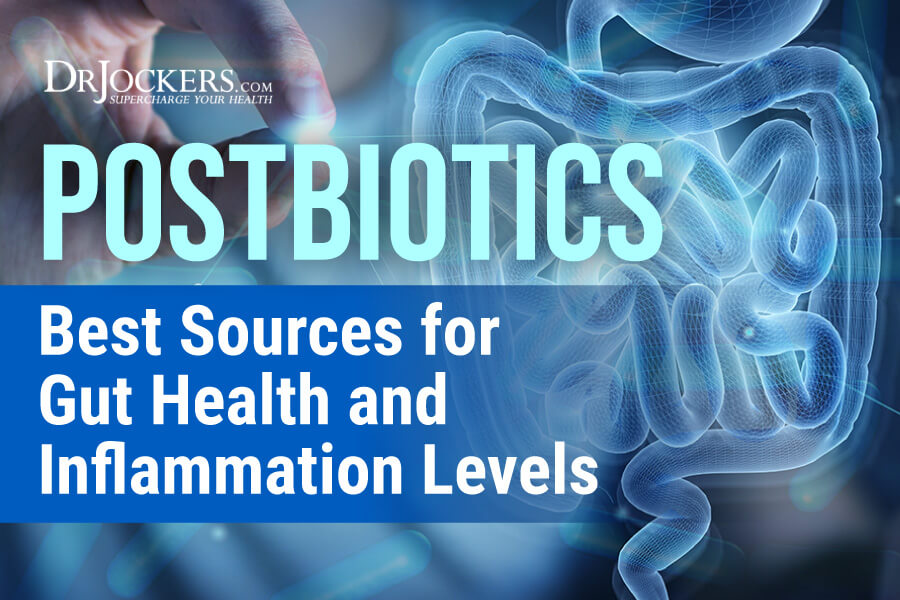 Postbiotics: Best Sources for Gut Health and Inflammation Levels
Postbiotics: Best Sources for Gut Health and Inflammation Levels
You have heard about probiotics and prebiotics. But have you heard about postbiotics. Postbiotics are just as important for your gut health as prebiotics and probiotics are, yet we rarely hear about them.
In this article, you will learn what postbiotics are. I will go over the different types of postbiotics you need to know about. You will understand how postbiotics are produced in your gut. I will explain the benefits of postbiotics. You will learn about the best food sources and supplements for postbiotics. I will introduce you to Tributyrin-X, my favorite supplement for postbiotic benefits.
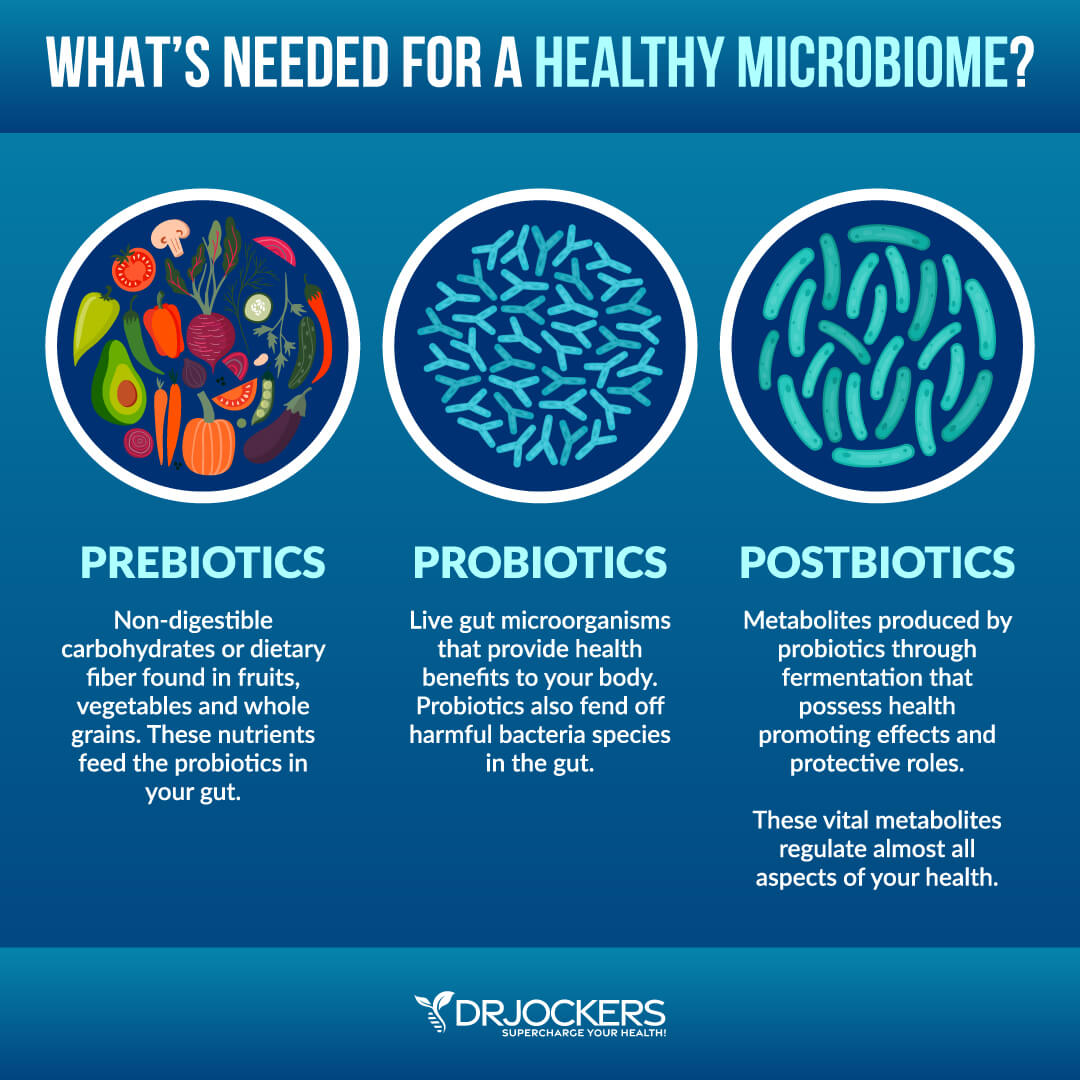
What are Postbiotics
Before I get into what postbiotics are, you need to understand what are prebiotics and probiotics. The three are part of the same system and work together for your gut health.
Prebiotics
Prebiotics are a type of non-digestible dietary fiber found in various plant-based food. The human body is unable to break prebiotic fibers down, which means that they move through the upper portion of your gastrointestinal tract in an undigested form. After moving through your small intestines and when they finally arrive at your colon, they end up being fermented by your gut microbiome (1, 2).
Here prebiotics ends up feeding the friendly bacteria or probiotics in your gut. This helps to create a variety of important nutrients, including short-chain fatty acids such as butyrate, acetate, and propionate. This process supports a healthy gut microbiome.
Prebiotic-rich foods include asparagus, Jerusalem artichokes, apples, dandelion greens, onions, garlic, bananas, leeks, jicama root, and yacon root. While prebiotics has many gut health benefits they may not be right for everyone at all times. Some people find too many prebiotics irritating and need to eat only in moderate amounts. It is also not right for you if you are on a low-FODMAP or carnivore diet.
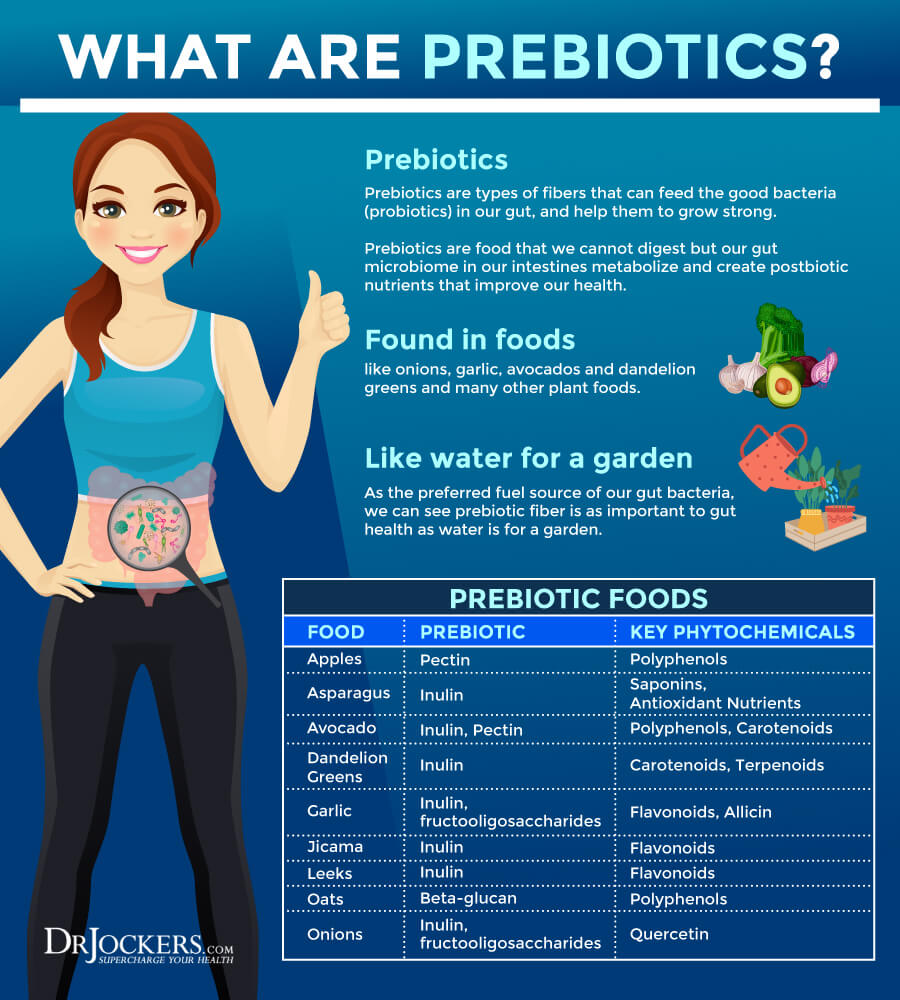
Probiotics
You have up to 300 trillion of bacteria living inside you outnumbering the number of cells you have. Some of these bacteria are friendly and beneficial for your health. Others are harmful and can cause imbalance and disease. The goal is to have a good balance and more beneficial bacteria than harmful ones.
Probiotics are healthy bacteria found in your gut. They offer various health benefits, including improved digestion, better immune function, healthier skin, improved mental and brain health, reduced inflammation, lower risk of disease (1, 3).
Probiotics can come from food and supplements. Probiotic-rich foods and drinks include fermented vegetables, sauerkraut, kimchi, kefir, yogurt, tempeh, and kombucha. While most people thrive on eating these foods, they are not right for everyone. If you have histamine intolerance, for example, fermented foods can be triggering and should be avoided.
Most people can benefit from taking probiotic supplements, especially if they have digestive symptoms and gut microbiome imbalance issues. There are a variety of probiotic supplements out there with different strains of bacteria, different doses, and different forms.
For example, if you have small intestinal bacteria overgrowth (SIBO), I recommend choosing a soil-based probiotic, as certain bacteria in other types can be triggering for SIBO while perfectly fine for those without SIBO. It is important to choose the right one for you and rotate your supplement regularly. You may also find probiotic supplements with prebiotics in them. You can learn more about probiotics and how to choose the right supplement for you by reading this article.
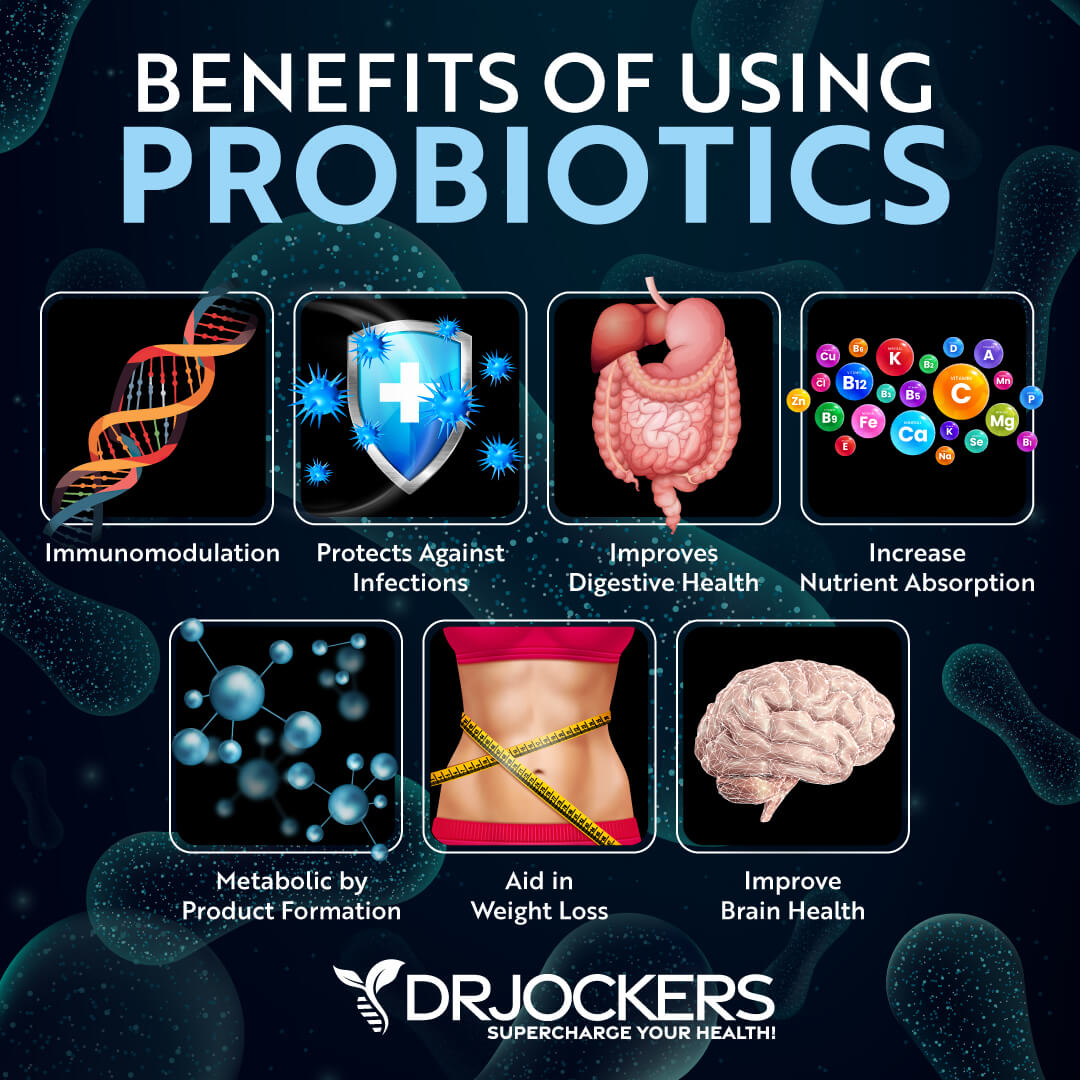
Postbiotics
The importance of prebiotics and probiotics are well-known in health circles and even in the mainstream at this point. But we rarely talk about probiotics despite their critical role in your gut health. Postbiotics are metabolites or byproducts of the fermentation process by probiotics in your gut. Probiotics feed on prebiotics and produce postbiotics. The three are part of the same process. They complement each other and all play a critical role in your gut health.
According to a 2020 study published in Nutrients, using postbiotics may be an effective strategy for improved gut health (4). Some of the benefits that we tend to attribute to probiotics actually come from the benefits of postbiotics.
Postbiotics offer many benefits, including improved digestive health and better immune function, I will go over these benefits later in this article. You can experience the benefits of postbiotics from certain foods and supplements, which I will also go over in this article.
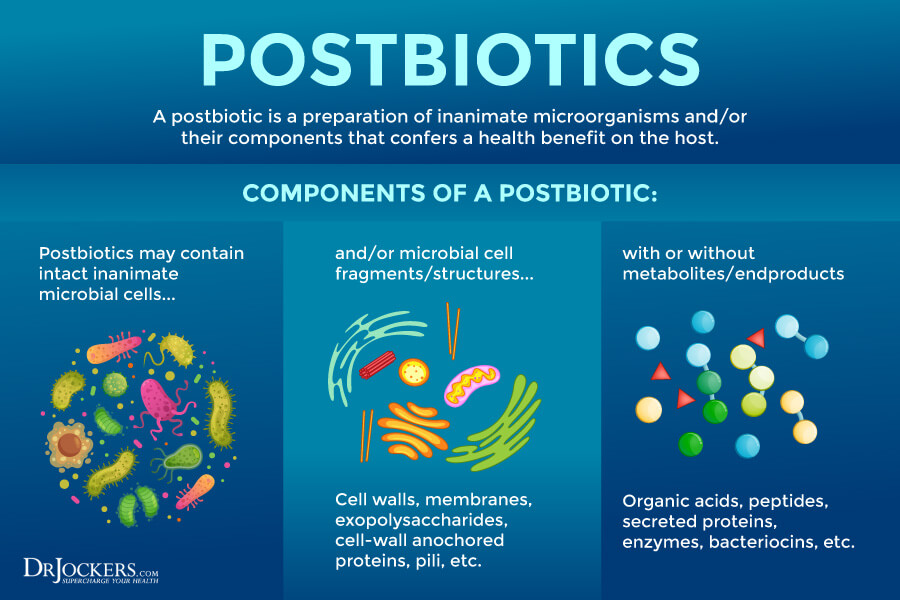
Types of Postbiotics
Types of postbiotics include:
- Short-chained fatty acids
- Enzymes
- Lipopolysaccharides
- Exopolysaccharides
- Bacterial lysates which are many from a mix of bacterial components
- Cell wall fragments
- Cell-free supernatants made by bacteria and yeast.
- Vitamins, amino acids, and other metabolites
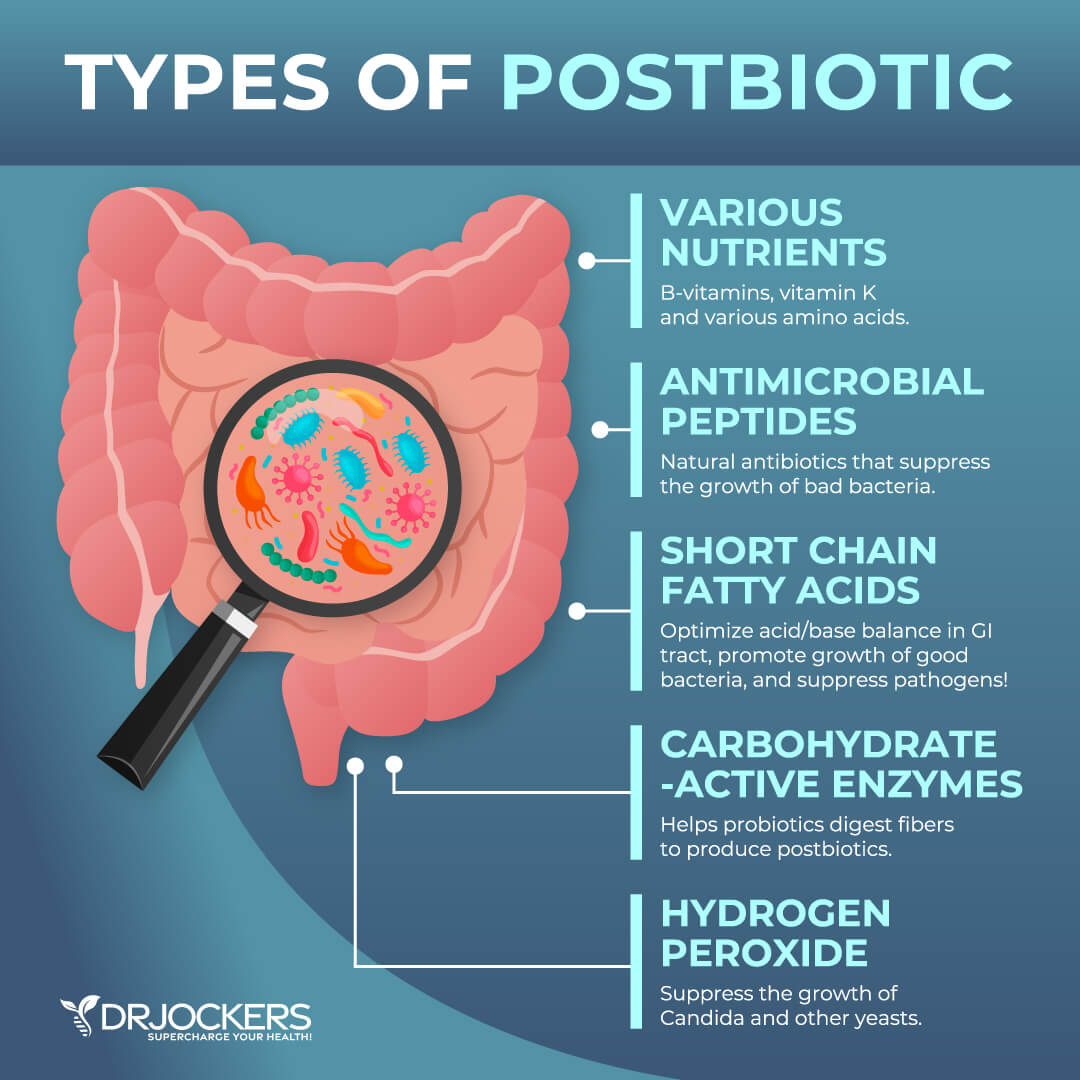
How are Postbiotics Produced in the Gut
For postbiotics to produce in your gut, first, you need probiotics. Probiotics carry out a fermentation process in your gut. Postbiotics are the byproducts of this fermentation activity. Postbiotics are essentially a waste product of probiotics.
While the word “waste product” may sound negative to you, according to a 2019 review published in the International Journal of Molecular Sciences, postbiotics are functional bioactive compounds that have multiple health benefits you will learn about in the next section (5).
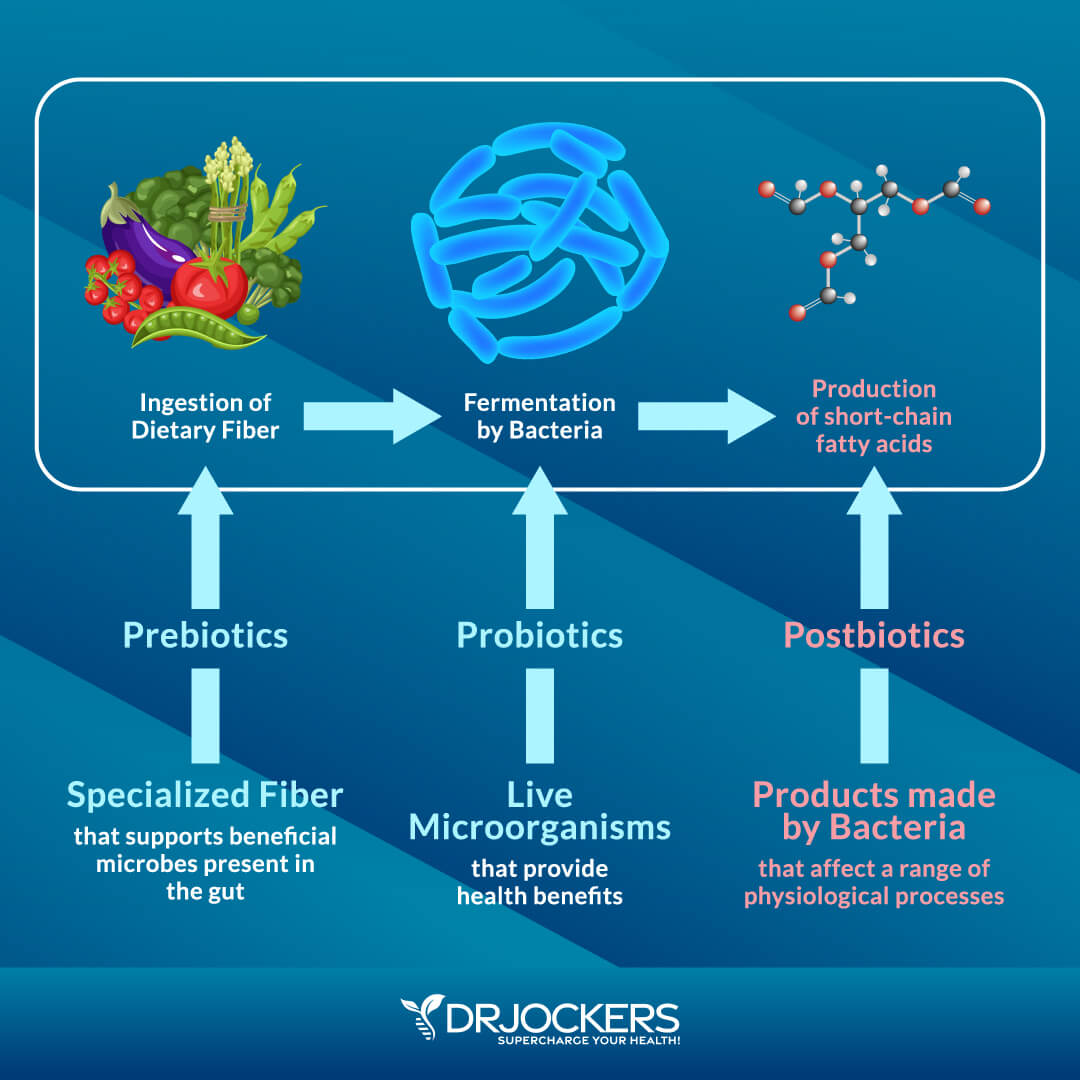
Benefits of Postbiotics
Postbiotics offer many health benefits, including a healthy microbiome, reduced harmful pathogens, stronger intestinal lining, reduced inflammation and oxidative stress, reduced food sensitivities and intolerances, and improved blood sugar and metabolic health. Let’s look at these benefits one by one.
1. Supports a Healthy Microbiome
If there is one thing that’s key for your overall health, it’s a healthy microbiome. If you have too many harmful bacteria and other pathogens in your gut and too few beneficial bacteria, it will lead to gut microbiome imbalance and gut dysbiosis.
Gut dysbiosis can disrupt your entire health and can lead to chronic inflammation, gut health issues, a poor immune system, brain fog, poor memory, mental health issues, poor skin, the risk of autoimmunity, and the risk of chronic disease. You may learn more about gut dysbiosis in this article and how to protect your gut microbiome in this article.
One of the ways to support a healthy microbiome is postbiotics. A 2014 review published in Current Opinions in Biotechnology has found that postbiotics from your diet may strengthen your intestinal microbiome (6). A 2020 review published in Nutrients has also noted the potential benefits of postbiotics for your microbiome health (7).
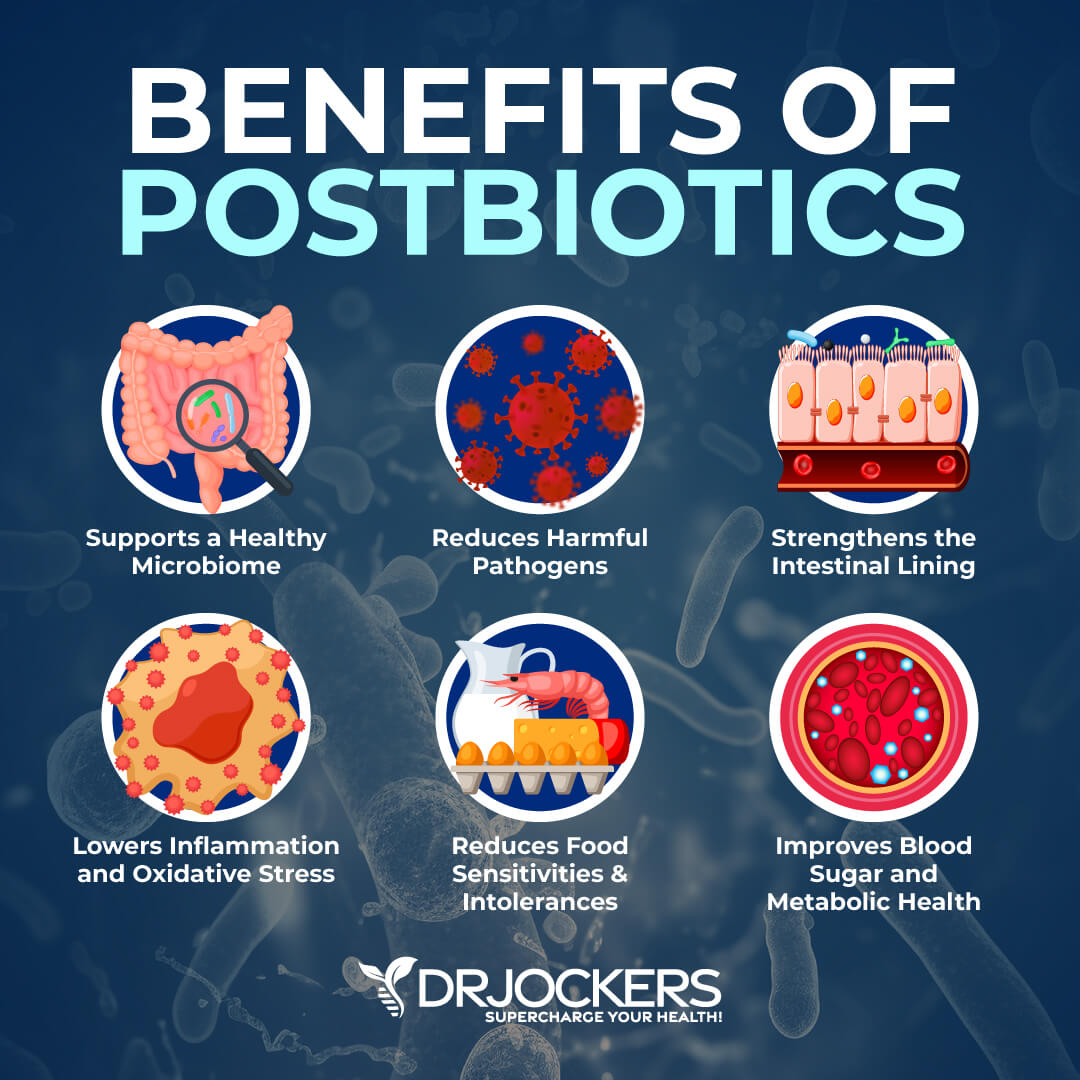
2. Reduces Harmful Pathogens
Various pathogens are responsible for various diseases. We all encounter pathogens, of course, but a healthy body is able to fight them off. If your health is compromised, tackling pathogens becomes more difficult increasing the risk of infections and health issues.
Postbiotics may also help to reduce harmful pathogens, such as harmful bacteria and viruses, that may disrupt your health. A 2020 systematic review looking at 7 studies of 1,740 children (8). Researchers found that supplementing with postbiotics may help to reduce the risk and support the treatment of diarrhea, laryngitis, and pharyngitis in children.
A 2011 study published in Digestive Disease has looked at 297 patients and found that postbiotics may help to reduce diarrhea associated with irritable bowel syndrome (IBS) (9). A 2020 review published in Nutrients has also found that postbiotics may reduce pathogens in the gut (7). Another 2020 published in Microorganisms has found that postbiotics may help to reduce pathogens, fight pediatric infectious disease, and reduce related mortality in children (10).
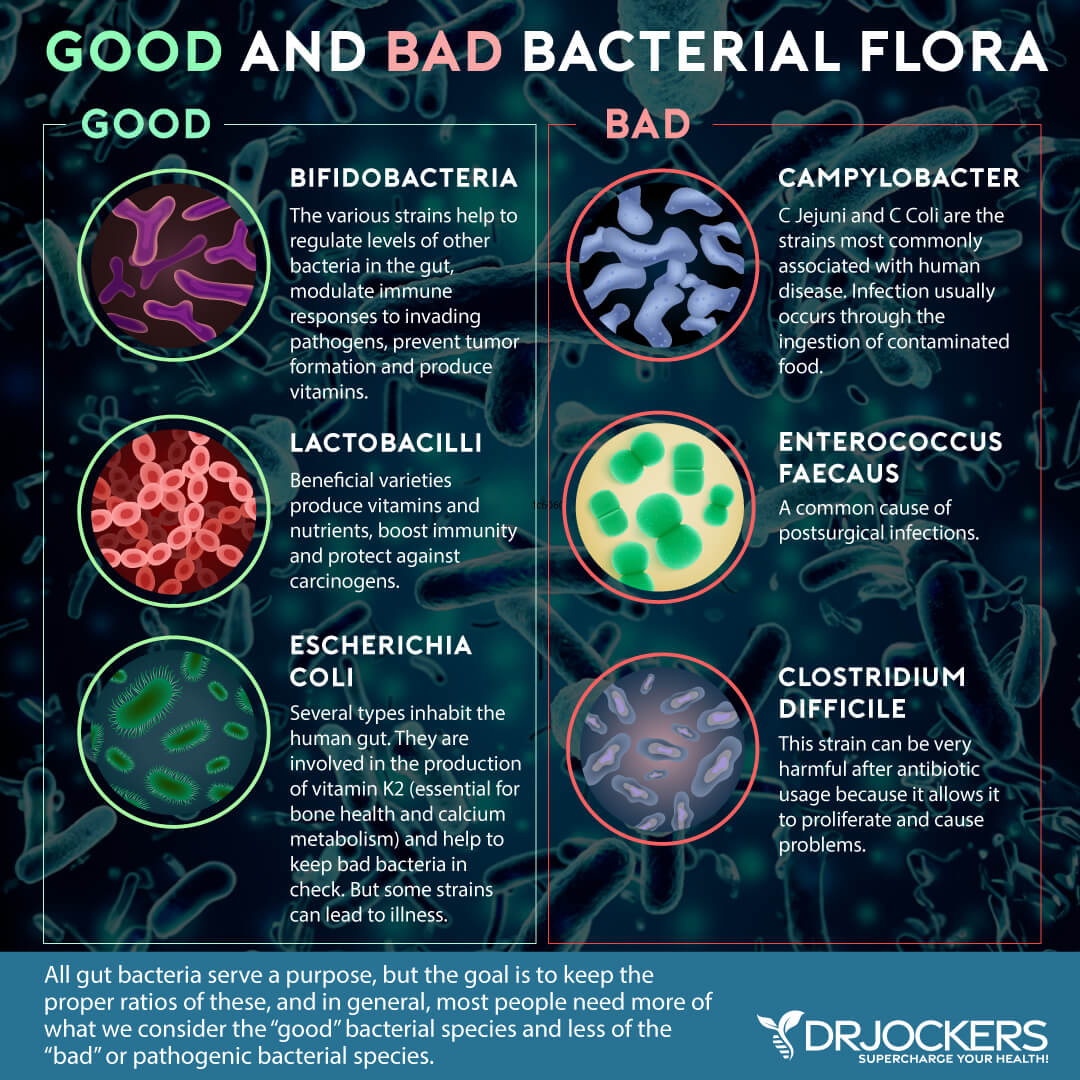
3. Strengthens the Intestinal Lining
The health of your intestinal lining is critical for your overall health. Under healthy circumstances, your semi-permeable intestinal lining is able to allow nutrients to pass through to into your bloodstream but stop undigested food particles, pathogens, toxins, and other harmful substances.
A poor diet, stress, environmental toxicity, and various lifestyle factors can compromise the health of your intestinal lining. When this happens, the small holes on your intestinal lining become larger and undigested food particles, pathogens, and toxins can escape to your bloodstream and the rest of your body.
This means that you have leaky gut syndrome, which may increase the risk of chronic inflammation, digestive issues, other chronic symptoms, autoimmunity, and chronic health issues.
Postbiotics may help to support your intestinal lining health. A 2019 article published in the Journal of Nutrition has argued that postbiotics may be the key to reducing the risk of leaky gut (11).
A 2020 review published in Nutrients has also found that postbiotics may help to support the integrity of the intestinal barrier (7). Another 2020 published in Microorganisms has found that postbiotics may help to support the health of the intestinal lining in children (10).
A compromised gut lining and leaky gut can increase the risk of gut health issues and autoimmunity, which postbiotics may help to improve. A 2005 study published in the Alimentary in Pharmacology & Therapeutics has found that the postbiotic, short-chain fatty acid butyrate may be beneficial for mildly to moderately active cases of Crohn’s disease (12). A 2018 review has found that butyrate may offer therapeutic benefits for inflammatory bowel diseases (IBDs) (13).
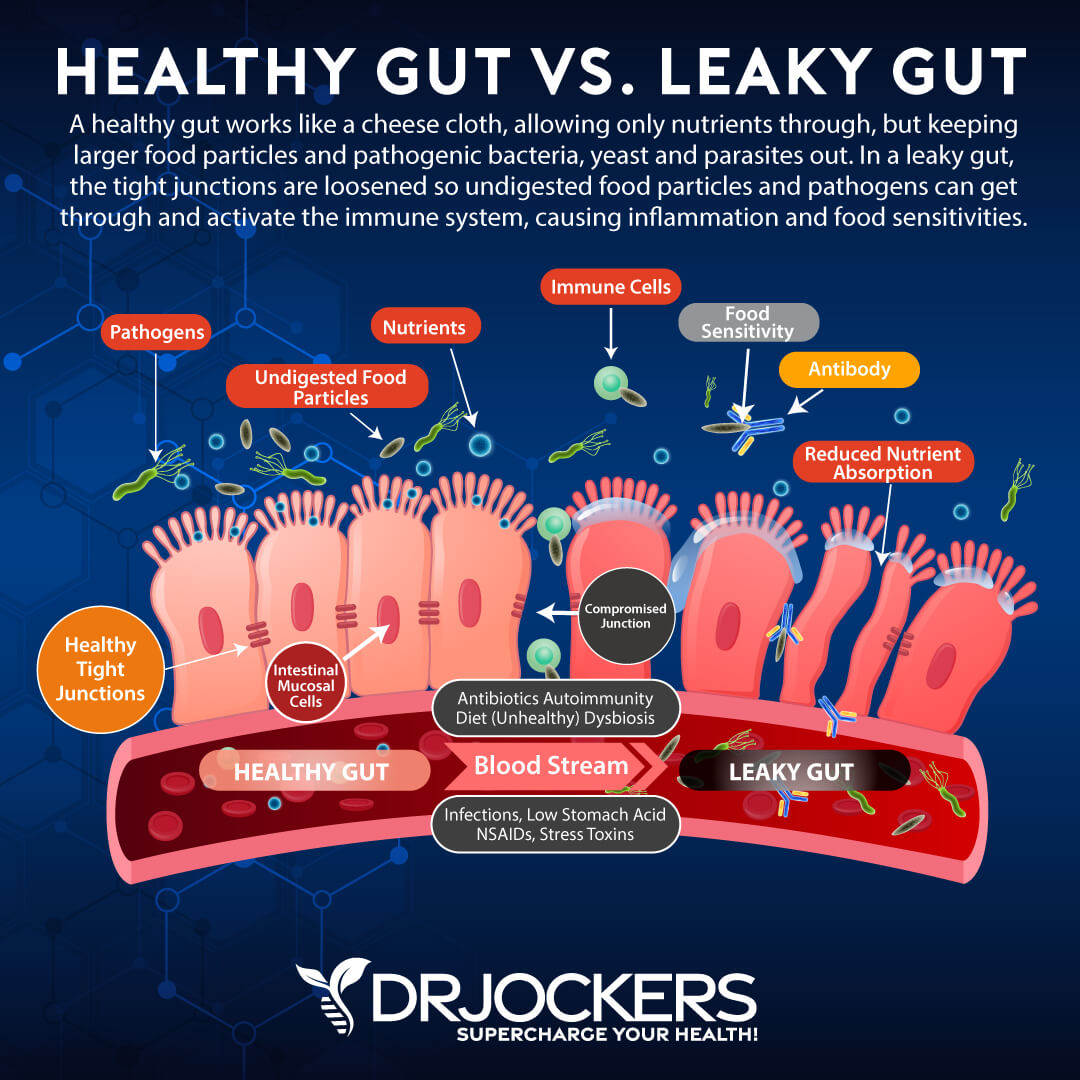
4. Lowers Inflammation & Oxidative Stress
Chronic inflammation and oxidative stress can increase the risk of chronic symptoms and chronic health issues. It turns out, postbiotics may offer benefits on this front as well by lowering inflammation and oxidative stress.
A 2018 review has found that butyrate may help to reduce inflammation related to IBDs (13). A 2020 review published in Nutrients has found that postbiotics may help to lower inflammation in the body (7). 2021 study published in Frontiers in Veterinary Science has found that probiotics from Lactobacillus Plantarum, a probiotic strain, may offer anti-inflammatory and antioxidant properties (13).
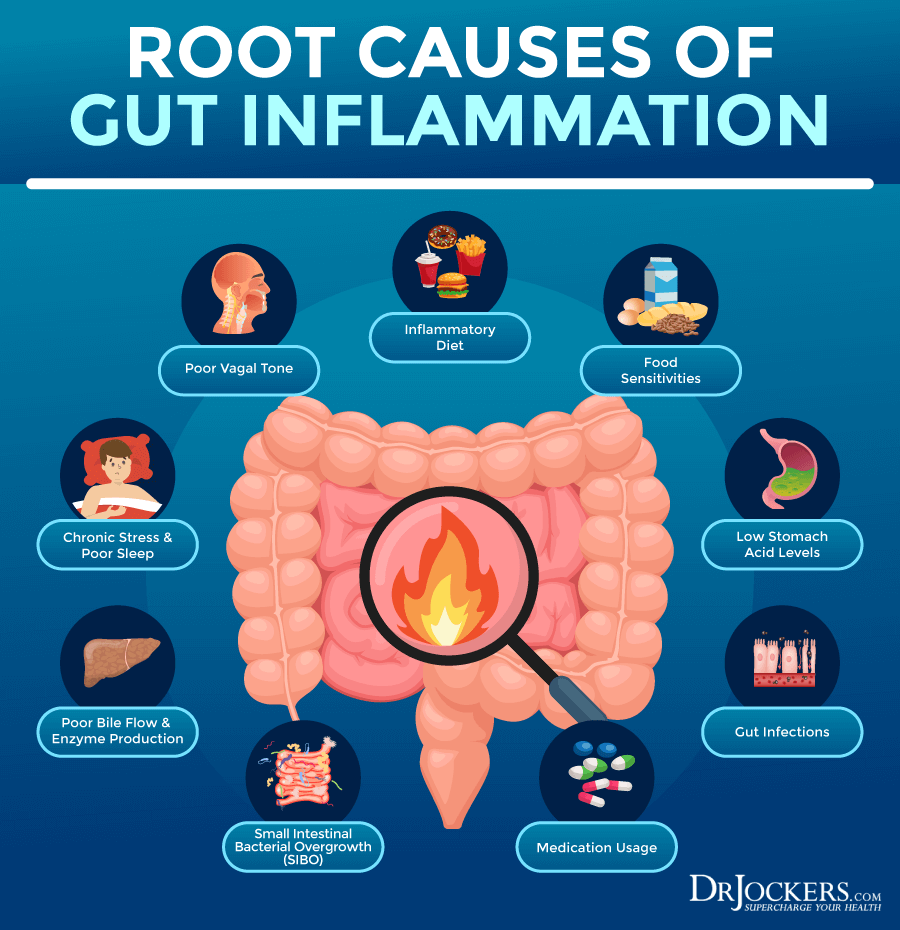
5. Reduces Food Sensitivities & Intolerances
Food sensitivities and food intolerances are underlying root issues under many chronic symptoms and health issues. They can increase the risk of chronic inflammation, gut microbiome imbalances, and various health problems, yet they often go unnoticed. Postbiotics may help to reduce the risk or improve food sensitivities and intolerances.
A 2020 review published in Nutrients has found that postbiotics may help with food allergies, sensitivities, and intolerances (7). A 2016 study published in the Journal of Allergy and Clinical Immunology has found that postbiotics can improve the gut microbiome and reduce allergies to cow milk in children (14). A 2021 review published in Critical Reviews in Food Science and Nutrition has found that postbiotics may improve immune tolerance and offer a new strategy for food allergies and intolerances (15).
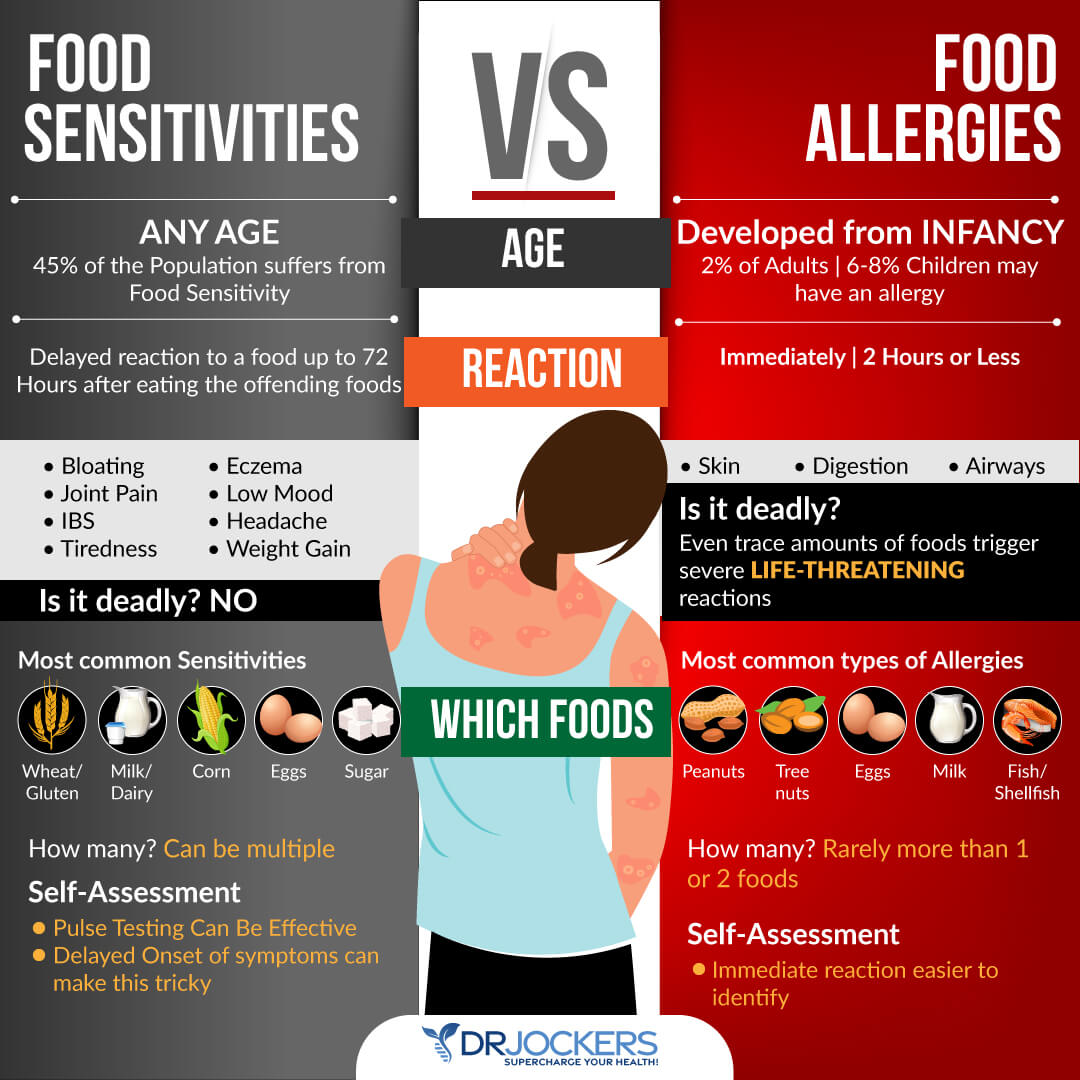
6. Improves Blood Sugar & Metabolic Health
Metabolic syndrome may also increase your risk of heart disease, heart attacks, and stroke. Postbiotics may help to improve factors, such as poor cholesterol and high blood pressure, that can contribute to heart health issues. A 2008 review published in IUBMB Life has found that short-chain fatty acids may help to improve cholesterol (19). A 2018 review published in Clinical Science (London) has found that butyrate may help to improve blood pressure levels (20).
Stable blood sugar is critical for your overall health. Blood sugar imbalances can increase the risk of chronic inflammation and various health issues, including insulin resistance and type 2 diabetes. Yet insulin resistance, prediabetes, type 2 diabetes, and metabolic health issues are rampant. Postbiotics may help to improve your blood sugar and metabolic health.
A 2014 review published in Gut has found that butyric and other short-chain fatty acid postbiotics may support the gut microbiome and may play a key role in reducing diabetes and metabolic syndrome (16). A 2015 review published in the International Journal of Obesity has found that short-chain fatty acid postbiotics may help to regulate appetite and energy homeostasis and reduce the risk of obesity (17).
A 2016 review published in Orvosi Hetilap has found that postbiotics may help to reduce the risk of insulin resistance, obesity, diabetes, and metabolic syndrome (18). A 2020 review published in Nutrients has also noted that by supporting the gut microbiome, postbiotics may help to reduce the risk of diabetes (7).
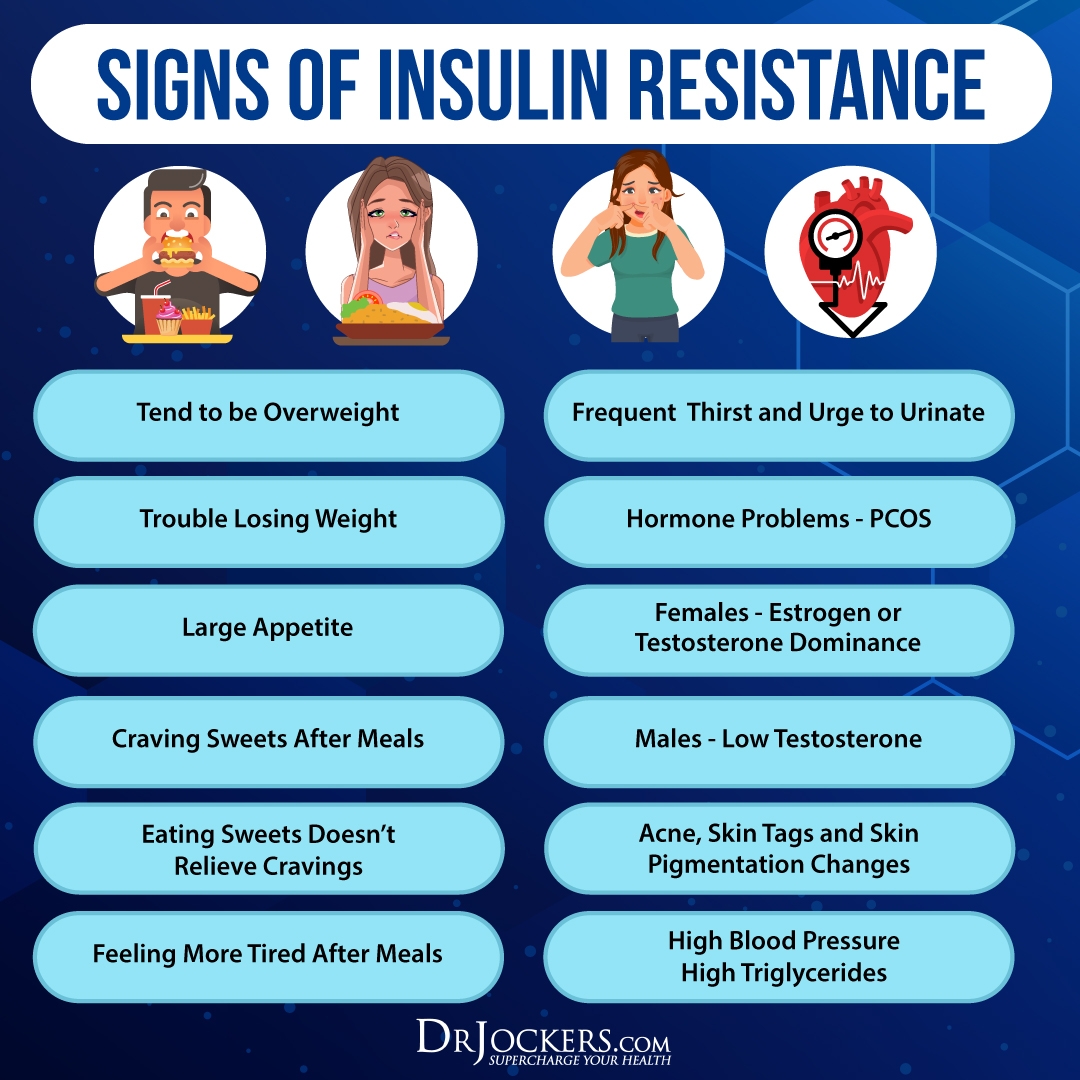
Best Food Sources of Postbiotics
Food and nutrition is always the first step to health. Here are the best food sources of postbiotics I recommend including in your diet:
Apple Cider Vinegar
Many people think that apple cider vinegar is a probiotic. Apple cider vinegar is a byproduct of fermentation. However, it doesn’t have enough live bacteria to be considered a probiotic.
It is actually a postbiotic that contains beneficial compounds as a result of the fermentation process. Apple cider vinegar is great for your digestion, immune health, and blood sugar.
Fermented Vegetables
Fermented foods are great for probiotic benefits and also increase postbiotics for optimal gut health. Fermented vegetables may include fermented cabbage like sauerkraut, beetroot, carrots, turnip, and radishes.
Many don’t know, but you may also ferment herbs for similar benefits. Fermented herbs may include fermented basil, thyme, cilantro, parsley, dill, lemon balm, mint, fennel, celery leaves, chives, garlic cloves and hot pepper. Fermented vegetables and herbs are great for your microbiome balance, digestion, and immune health.
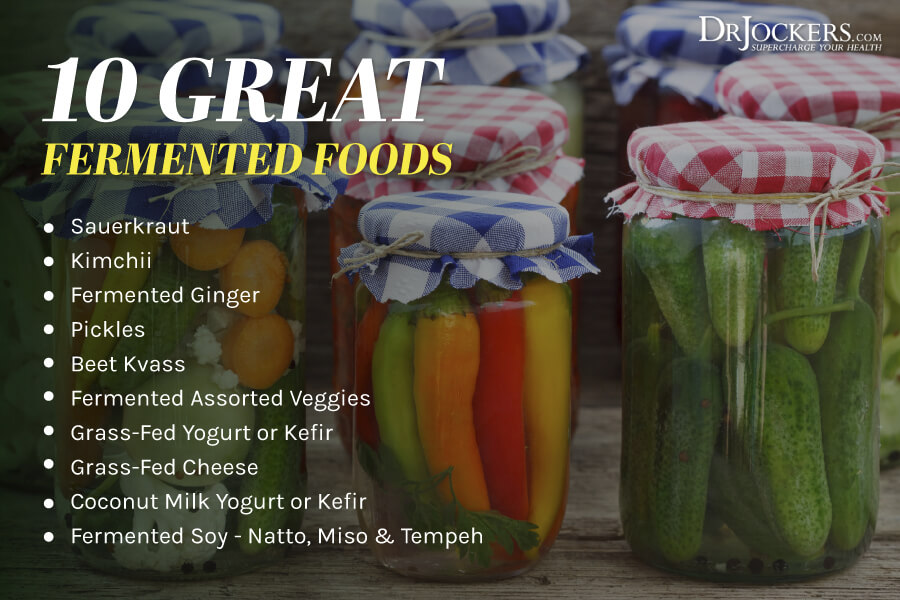
Coconut Water Kefir or Kombucha
Coconut water kefir and kombucha are two excellent drinks with postbiotic benefits. Coconut water kefir is coconut water that has been fermented with kefir grains. It can support your gut microbiome, digestion, and immune health.
Kombucha is a very popular fermented, lightly effervescent black or green tea that you can easily find in any grocery store in various flavors. Kombucha may help to fight infections, improve your digestive health, support your immune health, and help to balance your blood sugar.
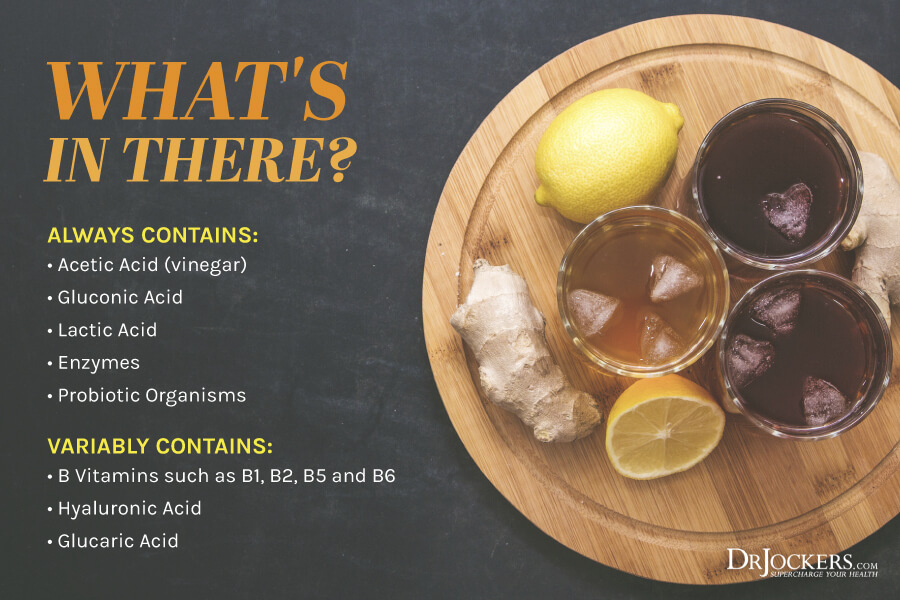
Best Supplements for Postbiotics
You can receive your postbiotics needs through supplementations as well. Here are the best supplements for postbiotics:
Fulvic/Humic Acid
Bioactive Carbons are a form of carbon that helps to create and sustain life in a cell. Bioactive Carbons are generated when important microbes decompose old plant matter and make it into nutrient-rich dirt and soil. Bioactive Carbons contain two essential plant-based acid extracts: fulvic and humic acid. Both of these compounds are made up of carbon, hydrogen, and oxygen. These are the exact same elements that also make up nearly all of your body.
Fulvic and humic acid are both postbiotic metabolites made by probiotic bacteria that break down organic matter in the soil. Fulvic and humic acid may help to support your metabolism, reduce heavy metal toxicity, support cellular detoxification, and help mineral balance.
They help to maintain an optimal level of acidity in your gut. A 2018 study published in the Journal of Diabetes Research has found that fulvic acid may be beneficial for diabetes and inflammatory diseases (21). You may learn more about fulvic and humic acid in this article.
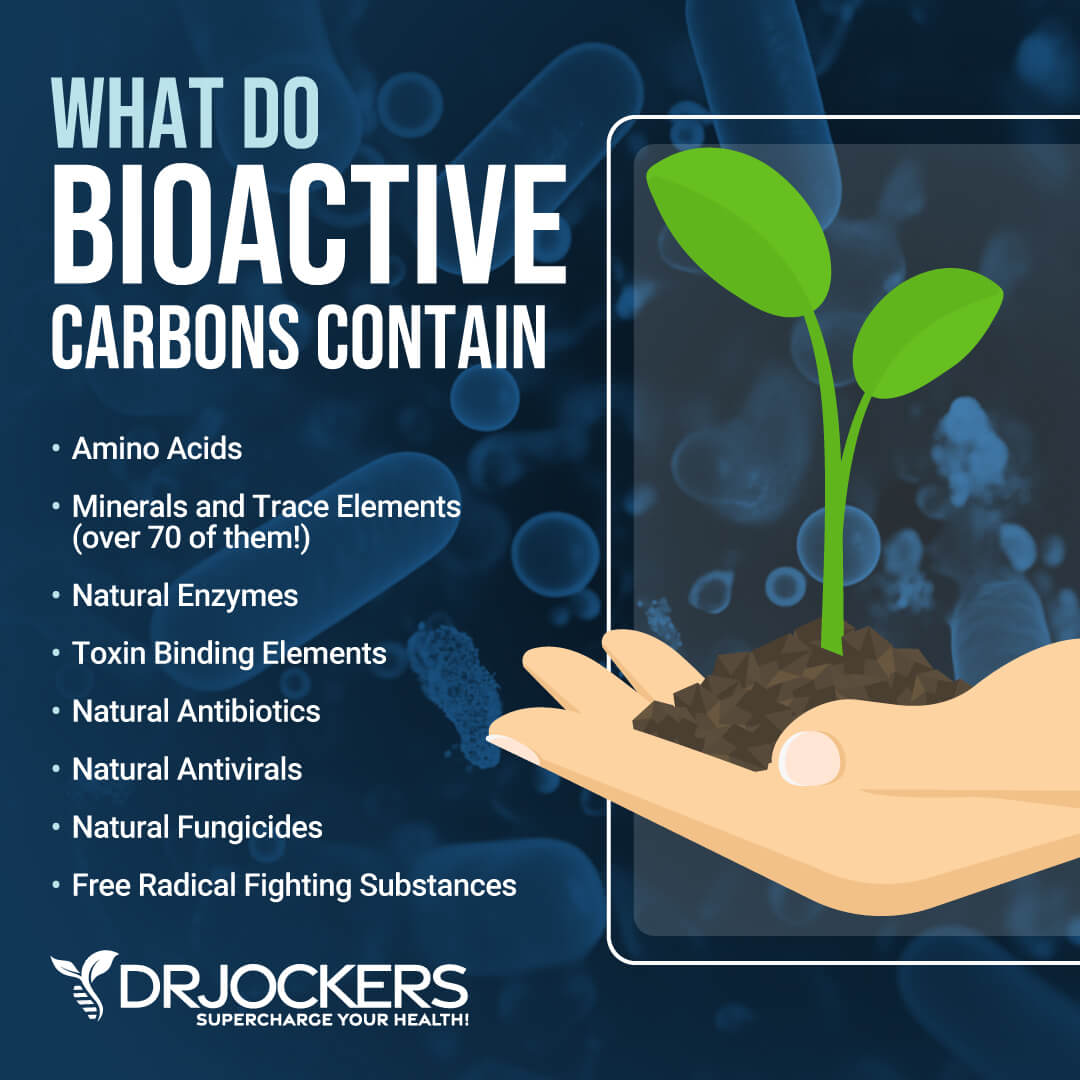
Himalayan Shilajit
Himalayan Shilajit is a natural substance that can be found in the Himalayan region. The gradual decomposition of various plants by microorganisms in this area created this substance that you can use as a supplement for its postbiotic and other health benefits. It contains 84 trace minerals and toxin binding elements including iron, zinc, selenium, fulvic and humic acids.
For example, a 2012 study published in the International Journal of Alzheimer’s Disease has found that Himalayan shilajit may be beneficial for brain health and cognition (22). Another 2012 study published in the Journal of Ethnopharmacology has found that Himalayan shilajit may help to modulate mitochondrial function and the HPA axis and as a result may help to reduce symptoms of chronic fatigue syndrome (CFS) (23). A 2014 study published in Cardiovascular Toxicology has found that Himalayan shilajit may benefit your cardiovascular health as well (24).
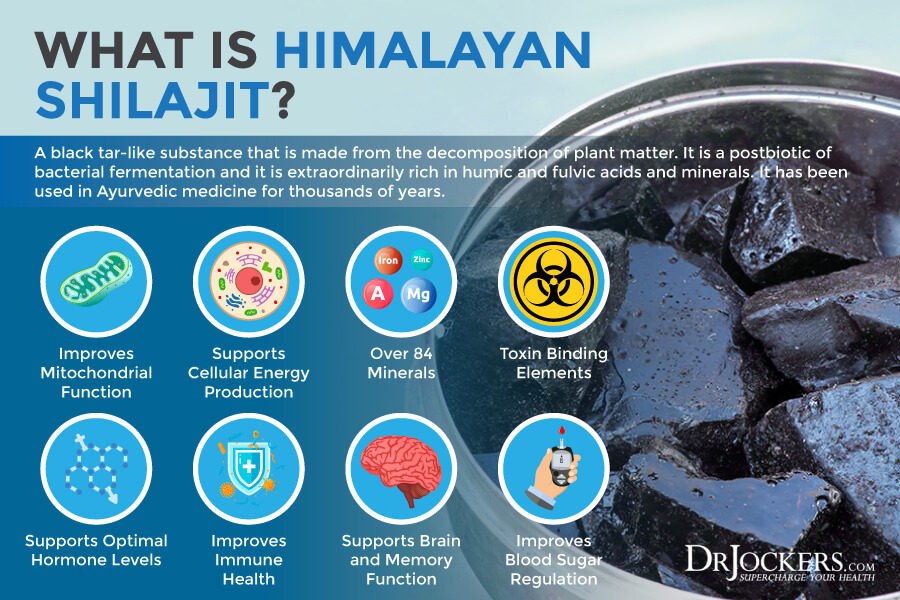
Butyric Acid
Butyric acid is a fatty acid. It is made by the beneficial bacteria in your intestines that break down prebiotic fibers. Butyric acid can also be found in vegetable oils and animal fats. For example, butter and ghee have a certain amount of butyric acid in them. However, it is a small amount if you compare it to what’s made in your gut.
Butyric acid offers postbiotic benefits and as a result, various health benefits. A 2005 study published in the Alimentary in Pharmacology & Therapeutics has found that the postbiotic, short-chain fatty acid butyrate may offer therapeutic benefits for Crohn’s disease (12).
A 2018 review has found that butyric acid may be beneficial for inflammatory bowel diseases (IBDs) (13). A 2014 study published in Adypocite has found that butyric acid may improve insulin sensitivity (24).
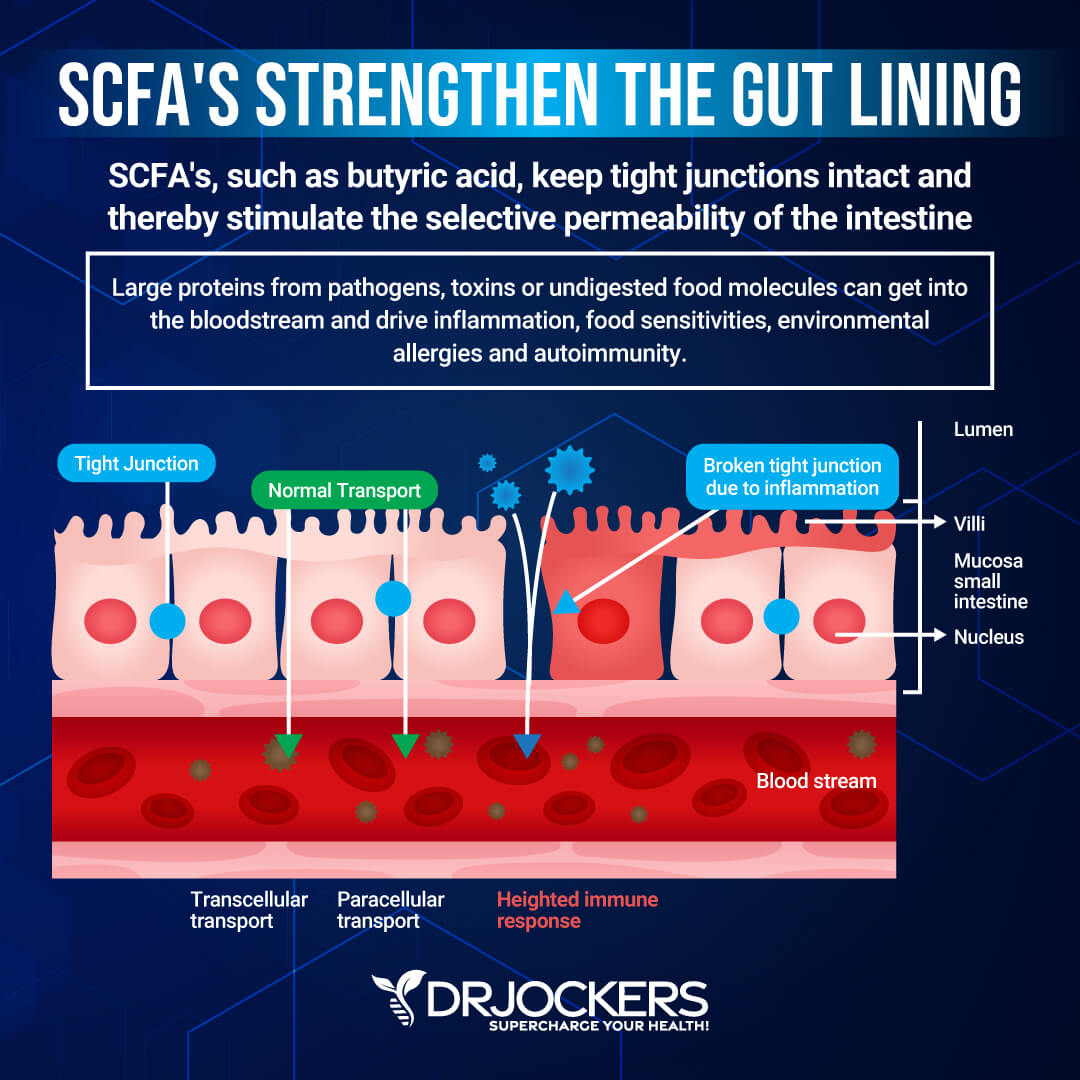
Introducing Tributyrin-X
For postbiotic benefits, I recommend Tributyrin-X. If you suffer from a dysfunctional immune system, leaky gut, chronic inflammation in the digestive tract, food sensitivities, bloating, digestive discomfort, or simply want to improve your gut microbiome and overall health then this is a great supplement for you. Butyrate or butyric acid is the most studied and most powerful of the 3 SCFA made by your intestines (acetate and propionate are the others).
I recommend Tributyrin-X over any other butyric acid supplement on the market simply because it offers the most advanced formulation. It is 99.9 percent professional-grade Pure Liquid Tributyrin. It offers tributyrin, the most bioavailable form of butyrate. It is gluten-free, lactose-free, non-GMO with no fillers, no charcoal, no silicon dioxide, and no stearates. The softgel capsules are easy to swallow. There is no smell, no burps, and no aftertaste.
Benefits may include:
- Supports leaky gut healing
- Encourages regular bowel movements
- Soothe histamine and mast cells
- Powerful leaky gut & tight junction support
- Regulation of gut speed (motility)
- Promotes microbiome diversity
- Helps healthy mucosal layers
- Supports proper immune system activity
- Supports healthy mast cells and histamine levels
- Supports healthy weight management
Most practitioners recommend taking up 1,500 mg a day for 30 days for optimal benefits. However, it’s important that you start slowly with one capsule a day 500mg to see how your body reacts. Start with 1 softgel a day and may take 1 to 3 capsules per day or more as directed by your health provider.
Inflammation Crushing Ebundle
The Inflammation Crushing Ebundle is designed to help you improve your brain, liver, immune system and discover the healing strategies, foods and recipes to burn fat, reduce inflammation and Thrive in Life!
As a doctor of natural medicine, I have spent the past 20 years studying the best healing strategies and worked with hundreds of coaching clients, helping them overcome chronic health conditions and optimize their overall health.
In our Inflammation Crushing Ebundle, I have put together my very best strategies to reduce inflammation and optimize your healing potential. Take a look at what you will get inside these valuable guides below!
Final Thoughts
Postbiotics are just as important for your gut health as prebiotics and probiotics are, yet we rarely hear about them. To support your gut health, immune function, metabolic health, and other areas of your health, I recommend that you add foods and supplements listed in this article for postbiotic benefits.
If you want to work with a functional health coach, I recommend this article with tips on how to find a great coach. On our website, we offer long-distance functional health coaching programs. For further support with your health goals, just reach out and our fantastic coaches are here to support your journey.







Looking for help with gastric and stomach problems
Hello Lucrecia – yes, here is a helpful article on gastritis: https://drjockers.com/gastritis/